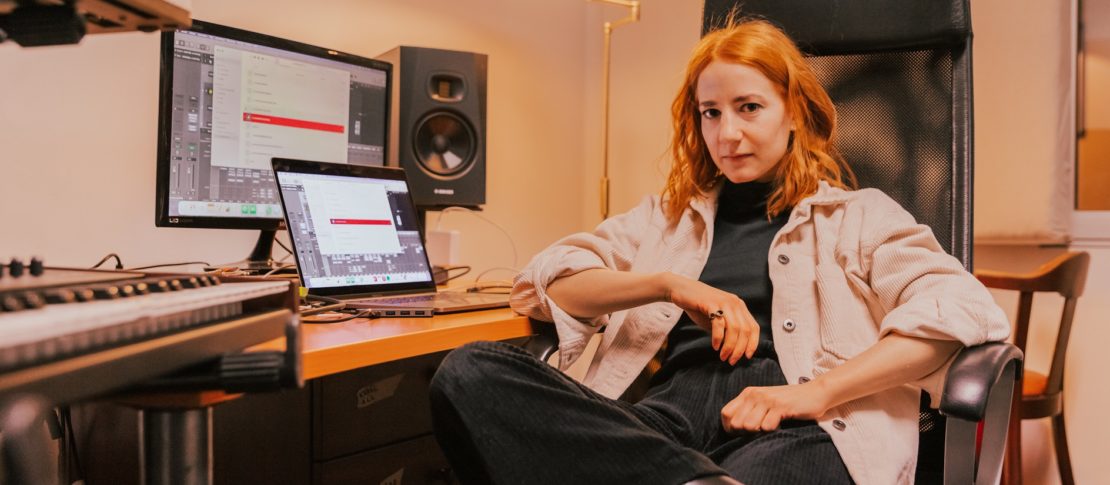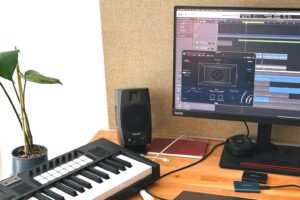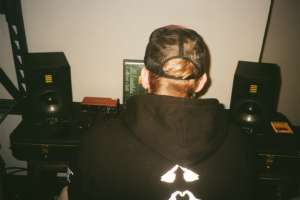
Experience and equal opportunities
Are you familiar with these moments that you look back on in awe years later, but in that very moment you just had no idea how unforgettable they would be, because you were too committed to the pure excitement?
One such moment for me was when a number of audience members stormed our stage, causing my synths to jump around 10 centimeters in the air. Nevertheless, I still tried to carry on playing in time. Or when this huge storm hit us towards the end of our set and the lightning struck the stage, forcing us to evacuate. Luckily my synths weren’t damaged, probably what I feared most when it happened. All of these incredible experiences make life as a musician memorable and beautiful. I could carry on listing such memories forever, but I would also like to share some other experiences as well.
I also remember the backstage areas being mostly empty of women, and technicians asking you if you know the difference between mono and stereo. Or organizers who would only address the male members of the band, and whose worlds apparently turn upside down when they realize that YOU were the one driving the tour bus.
Even though it’s also nice to have the women’s backstage restroom to yourself, I’d rather it was different. At some point it was very irritating and incomprehensible just how fewer women than men you meet on your journey in the music business. Don’t get me wrong. Being backstage is not a solemnly frustrating thing, most of the time it’s OK, and sometimes it can be great. Especially when you get to hang out, chitchat and drink beer with one of your favorite artists, which in my case happened with e.g. „Portugal. The Man.“ I want to share the full extent of my experiences, also the problematic ones.
The music industry has, presumably, always been male dominated. And not just in the live sector. Usually it’s men who produce songs by artists and bands who also happen to be mostly men. Even though there are more-and-more initiatives and role models that oppose this endless cycle, there are still many more men than women in the industry. This is especially prevalent within music production where the numbers show the greatest lack of women.
2% female producers
Did you know that a woman has never won the ‘Producer of the Year’ award at the Grammys? How is it possible that on the Hot 100 Billboard charts between 2012-2019, just 2.6% of producers were women, and 3% were engineers? (See Inclusion Initiative, Dr. Stacy L. Smith, USC Annenberg, 2020). That’s not because there aren’t good female producers or engineers out there. There are! And pretty good ones, too! Linda Perry, for instance, was the only female nominated for Best Producer in 2019 [the first woman to be nominated in that category since Lauren Christy in 2004]. There’s also St. Vincent, Adrianne Gonzalez, Emily Lazar, Wondagurl, to name but a few.
Particularly when being represented in the media, women have to struggle with inadequacy or simply bad presentation, either portrayed somewhere in the background or hidden someplace else. So why are female producers/engineers still in short supply? One reason could be the lack of female role models, reinforced by a male-dominated media. More role models and more promotion of women in these fields could strengthen the lower number of female producers/engineers.
Examples such as the Grammy presentation for Adele’s “25”, which took place in front of an all-male production team, will hopefully no longer be a reality at some point. Shouldn’t women also find a place on the production team, especially with such great role models? In the movie industry, the “Inclusion Rider” initiative obliges production companies to ensure equal opportunities for gender equality, diversity, and the promotion of minorities. Having adequate support could be of great importance in the music industry. More female, self-determined artists would certainly enrich the entire market.
Another probable reason for this great disparity is the strong, conservative gender mentality within young people. Boys are still introduced or influenced to pursue technical professions more often than girls. As a result, there is a persistent deficit of women in musical-technical professions. How is it possible to generate more interest in these occupational fields in girls and young women, and to increase their representation as a whole?
A personal initiative for support
Along with some colleagues of mine, I was dealing with this question personally for a long time and so I put together a workshop that could offer support and possible solutions to rectify this.
In these workshops, children and adolescents (with a focus on girls and young women) have the
opportunity to create their own songs, regardless of style, in a studio setting, and to record and produce them and then take them home as their own bodies of work. We want to support them artistically, pedagogically and technically, and introduce them to recording techniques, producing, and the playing of (mainly electronic) instruments. What we’re offering is cooperation with social inclusivity. With our team of women, we introduce female role models at a younger age, while teaching musical technical skills.
Further Links:
- “Inclusion in the Recording Studio? – Gender and Race/Ethnicity of Artists, Songwriters & Producers across 800 Popular Songs from 2012-2019” by Dr. Stacy L. Smith, Dr. Katherine Pieper, Hannah Clark, Ariana Case & Marc Choueiti
- SheIsTheMusic.org
- WomensAudioMission.org
- Grammy’s Task Force On Inclusion & Diversity

